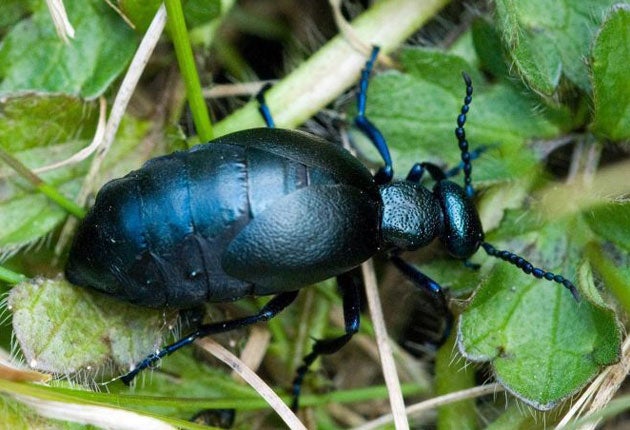Hunt launched for oil beetles

An SOS has been issued for what have been described as Britain’s dopiest insects with experts appealing to the public to help establish where the flightless beetles can still be found.
Little more than a century ago eight species of oil beetle were known to be living in Britain but the destruction of 93 per cent of the nation’s flower meadows and the decline of bees have reduced their numbers dramatically.
Four species have already been driven into extinction in Britain and two more are only clinging on in a handful of sites, leaving conservationists anxious to secure a future for the survivors.
Members of the public are now being asked to join in the first national survey of oil beetles, described as one of Britain’s “dopiest insects”, to establish where they can still be found and where their strongholds are located. And signposts in known hotspots are being errected to warn people to avoid treading on them.
The beetles, which are irridescent and ooze a foul-tasting oily substance from their knee joints to discourage predators, are regarded as a “really good indicator” of the overall health of the countryside - if they are plentiful, a wide variety of other species of plants and animals will be too.
The decline in of bees, in particular, has been linked to the slump in population because the beetle larvae depend on bee eggs for survival. Once the larvae have hatched they clamber up plants to await the arrival of a mining bee and then hitch a lift back to the underground nest where it eats the eggs and the pollen that had been stockpiled for the bee’s young.
“Oil beetles have been hit by the double whammy of flower-rich habitats disappearing from our countryside and a drastic reduction in populations of wild bees - upon which the beetles depend to complete their life cycles,” said Andrew Whitehouse, of Buglife which is leading the national survey.
“With the public’s help we can get a better understanding of the distribution of four species of oil beetle found in England , helping our efforts to enhance habitats to secure their survival.”
Buglife and the National Trust are asking members of the public to watch out for oil beetles and to record all sightings on an online form on the Buglife website. Information including the number, location and species seen will all be collated to built up a detailed picture oil beetle distribution in Britain. Photographs are welcomed and an information sheet helping identify each species is available online.
Nick Baker, a presenter of the really Wild Show and Buglife vice president, said: “Oil beetles are stunning and charismatic. But they appear very dopey as well. They have a very dopey persona. They don’t do things that fast.
“Even if you aren’t into beetles they are really good indicators of healthy wild flower meadows but we are losing them. They are definitely disappearing and their distribution is changing.”
Data gathered by “citizen scientists” for the project will provide an invaluable database which will help determine the reasons for the beetles’ continued decline.
Steve Backshall, the presenter of the Deady 60 wildlife series said: “We've already lost more than half of our native species of oil beetles so now is an essential time to learn all we can about these charming bugs, before we lose them forever."
The four species in Britain are the black, violet, rugged and short-necked oil beetle. The short-necked had been thought extinct in Britain having last been seen in 1948 but was rediscovered in 2007. The four species that are thought to have vanished from Britain, though can still be found in Europe, are the rainbow, scarred, autumnal and Mediterranean oil beetles.
Female oil beetles can reach 3.5cm long, making them one of Britain’s biggest insects.
Join our commenting forum
Join thought-provoking conversations, follow other Independent readers and see their replies
Comments
Bookmark popover
Removed from bookmarks